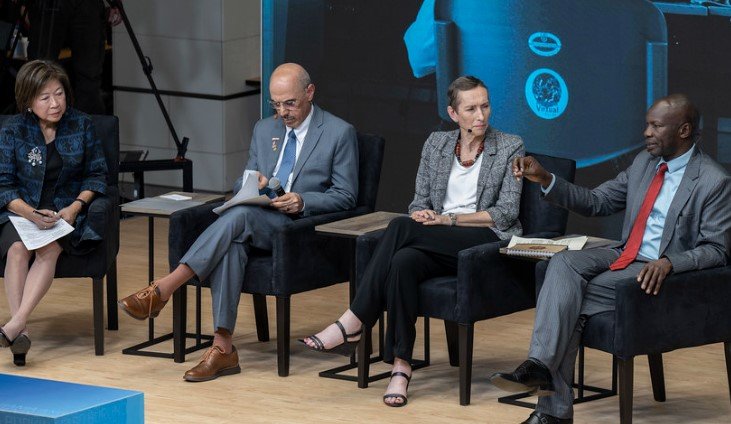The National Bank of Georgia (NBG) recently took part in a high-level meeting organized by the International Monetary Fund (IMF) and the World Bank. Held in Chisinau, Moldova, this annual gathering brought together central bank governors, finance ministers, regulators, and industry leaders from around the world. Representing Georgia, Vice-President Ekaterine Mikabadze emphasized the importance of international cooperation in addressing global economic challenges. The meeting focused on key issues such as financial stability, economic growth, and sustainable development.
Strengthening International Cooperation
At the meeting, Ekaterine Mikabadze highlighted the significance of international cooperation in fostering economic stability. She stressed that collaboration among central banks and financial institutions is crucial for addressing global economic challenges. By sharing knowledge and best practices, countries can develop more effective policies to promote financial stability and economic growth.
Mikabadze also underscored the importance of multilateralism in tackling issues such as inflation, currency fluctuations, and financial crises. She noted that the IMF and World Bank play a vital role in facilitating dialogue and cooperation among member countries. Through these platforms, nations can work together to find solutions to common economic problems.

Furthermore, Mikabadze emphasized the need for continued engagement with international organizations. She pointed out that the National Bank of Georgia is committed to participating in global forums and contributing to discussions on economic policy. By doing so, Georgia can benefit from the collective expertise of the international community and enhance its own economic resilience.
Addressing Financial Stability
One of the key topics discussed at the meeting was financial stability. Participants explored various strategies to strengthen the resilience of financial systems and mitigate risks. Mikabadze shared insights on Georgia’s efforts to enhance financial stability, including regulatory reforms and the implementation of robust risk management frameworks.
She highlighted the importance of maintaining a sound banking sector and ensuring that financial institutions are well-capitalized. Mikabadze noted that the National Bank of Georgia has taken proactive measures to monitor and manage risks within the banking system. These efforts have helped to safeguard the stability of the financial sector and protect the interests of depositors.
In addition, Mikabadze discussed the role of technology in promoting financial stability. She emphasized that advancements in financial technology (fintech) can enhance the efficiency and security of financial services. However, she also cautioned that the rapid pace of technological innovation poses new challenges and risks. Therefore, it is essential for regulators to stay vigilant and adapt to the evolving landscape.
Promoting Sustainable Development
The meeting also focused on the role of central banks in promoting sustainable development. Mikabadze highlighted Georgia’s commitment to sustainable economic growth and environmental protection. She noted that the National Bank of Georgia is actively involved in initiatives aimed at fostering green finance and supporting environmentally friendly projects.
Mikabadze emphasized that sustainable development requires a holistic approach that integrates economic, social, and environmental considerations. She pointed out that central banks can play a pivotal role in promoting sustainability by encouraging responsible investment practices and supporting green initiatives.
Moreover, Mikabadze discussed the importance of financial inclusion in achieving sustainable development goals. She stressed that access to financial services is essential for empowering individuals and communities. By promoting financial inclusion, central banks can help to reduce poverty and inequality, and contribute to overall economic development.
